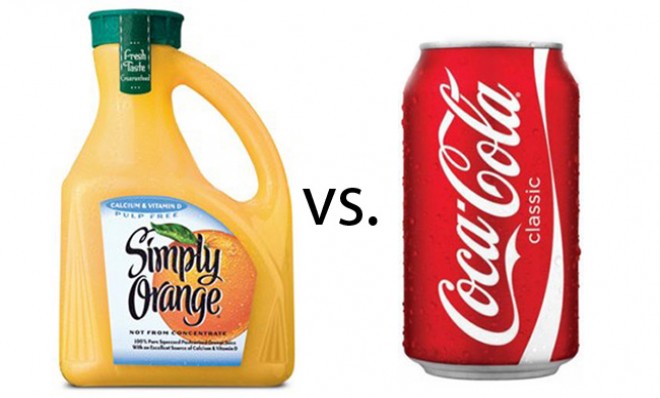Orange juice vs. Coke: Which is more processed?
Mass-producing Simply Orange brand O.J. is far from simple

A free daily email with the biggest news stories of the day – and the best features from TheWeek.com
You are now subscribed
Your newsletter sign-up was successful
Orange juice: It's a healthy, natural alternative to soda, right? After all, O.J. is packed with Vitamin C, it's still the same color as the fruit it comes from, and the packaging usually shows a fresh, juicy orange plucked straight from the tree. How processed could it be — especially compared with a can of Coke?
Apparently a lot more processed than it looks, at least for Coca-Cola Company's Minute Maid and Simply Orange brands.
Bloomberg Businessweek recently reported the Coca-Cola Company spent $114 million in recent years expanding its juice bottling plant in Auburndale, Fla., and developing a high-tech process for homogenizing juice. The operation includes use of satellite imagery, a 1.2-mile juice pipeline, and a complex "Black Book" algorithm which helps juice-makers manage weather patterns, predict crop yields, and measure acidity and sweetness of the crop — all to achieve absolute consistency from batch to batch.
The Week
Escape your echo chamber. Get the facts behind the news, plus analysis from multiple perspectives.

Sign up for The Week's Free Newsletters
From our morning news briefing to a weekly Good News Newsletter, get the best of The Week delivered directly to your inbox.
From our morning news briefing to a weekly Good News Newsletter, get the best of The Week delivered directly to your inbox.
To match the more than 600 flavors at play in a swig of orange juice, the plant blends on-season crops with off-season crops, removes pulp then adds it back, and covers the tanks of juice with a nitrogen gas blanket that keeps out rot-inducing oxygen. The O.J. recipe changes constantly and "natural flavors and fragrances captured during squeezing are added back into the juice to restore flavor lost in processing," Bloomberg reports.
Indeed, Revenue Analytics consultant Bob Cross told Bloomberg that orange juice "is definitely one of the most complex applications of business analytics. It requires analyzing up to 1 quintillion decision variables to consistently deliver the optimal blend, despite the whims of Mother Nature."
But despite the "1 quintillion" variables that O.J. manufacturers have to micro-manage to maintain sky-high standards, isn't the final product still more natural than Coke? Well, yes. But there's not as much daylight between the two as you might think.
One of the main ingredients in Coke is corn syrup. Manufacturers soak corn kernels in a solution made from water and a small amount of sulfur dioxide, which loosens the gluten bonds of the corn. They then break it down, separating the germ from the slurry, then the fiber from the starch and gluten, then the starch from the gluten. Next, the starch is washed, purified, and converted into corn syrup by adding acid and/or enzymes to a suspension of starch in water.
A free daily email with the biggest news stories of the day – and the best features from TheWeek.com
This is just for corn syrup — a single ingredient in Coke.
There's also the famous secret ingredient, known as merchandise "7X". Though the 7X recipe is still officially under wraps, This American Life's 2011 exposé, "Original Recipe," disclosed a suspected formula that included orange oil, lemon oil, nutmeg oil, cinnamon oil, oil of coriander, and neroli oil, along with alcohol, citric acid, caffeine, water, lime juice, vanilla, and FE Coca, meaning "fluid extract of coca leaves." To attain legal coca extract, the Stepan Chemical Company in Maywood, N.J., reportedly has to de-cocainize coca leaves.
After creating this syrupy concoction, Coke ships it out to licensed bottling plants that mix the syrup with filtered water, then carbonate and bottle it. It's an exceptionally complex process.
And so: Mass-producing O.J. is certainly not as natural or simple as the name "Simply Orange" suggests, but it's still a lot closer to the source than Coke. Plus, a serving has two grams of protein, plus Vitamin C, and some magnesium. That still counts for something, right?
Carmel Lobello is the business editor at TheWeek.com. Previously, she was an editor at DeathandTaxesMag.com.
-
 Political cartoons for February 16
Political cartoons for February 16Cartoons Monday’s political cartoons include President's Day, a valentine from the Epstein files, and more
-
 Regent Hong Kong: a tranquil haven with a prime waterfront spot
Regent Hong Kong: a tranquil haven with a prime waterfront spotThe Week Recommends The trendy hotel recently underwent an extensive two-year revamp
-
 The problem with diagnosing profound autism
The problem with diagnosing profound autismThe Explainer Experts are reconsidering the idea of autism as a spectrum, which could impact diagnoses and policy making for the condition